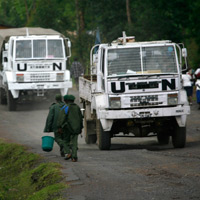
Executive Summary
More than two years have passed since Secretary of State Hillary Clinton traveled to
eastern Democratic Republic of Congo in August 2009, marking the highest level U.S.
visit ever to the war-torn region. Beyond the usual palliatives of solidarity with survivors
of the violence, the secretary expressed a strong commitment to addressing the causes
of conflict and unconscionable loss of human life—estimated to exceed 5 million, the
deadliest since World War II.
Two years later, Clinton’s personal commitment to addressing the underlying drivers
of conflict in eastern Congo has translated into a series of ad hoc initiatives but not yet
a cohesive U.S. policy. At the State Department, Congo now receives unprecedented
“Seventh Floor” attention, and a number of senior officials regularly speak out on the
need to address key issues, particularly sexual violence and conflict minerals. This has
resulted in a series of individual programs, from the $17 million initiative on sexual and
gender-based violence to a more recent $20 million livelihoods assistance program. The
United States has also been the largest financial backer of the U.N. mission in the Congo,
or MONUSCO; has pushed civilian protection reforms at the U.N.; and has trained one
Congolese army battalion through the Department of State and AFRICOM.
But the potential for U.S. engagement to end the war in the east is much larger, and with
incidents of mass rape and the proliferation of militias continuing, the need is greater
than ever. The United States has critical leverage that it can employ in Congo, and
President Kabila has renewed interest in deepening the partnership with the Obama
administration. As a leading women’s rights advocate in Bukavu told the Enough
Project, “The U.S. can have such an impact here. It is the only country that Rwanda and
[Congolese President Joseph] Kabila will listen to.”
It is time for the administration to back the secretary’s words and deliver on its promises
aimed at bolstering democratic processes and ending violence against civilians. With the
potential destabilizers of upcoming elections and implementation of the Dodd-Frank
conflict minerals legislation hanging in the balance, regional actors look to the United
States to play a strong role in these processes.
In the following report, we offer an assessment of U.S. policy on five different objectives
essential to peace and stability in Congo:
-
Engaging diplomatically in support of credible elections: The administration’s efforts to support free and fair elections have been hampered by the lack of a senior envoy, and Congo is now in serious danger of holding elections that have little credibility. We understand that the administration will appoint an envoy. In order to be effective, the envoy must be a senior-level person that holds the commensurate respect of regional leaders and the administration necessary for success, and should focus on free and fair elections, as well as the four regional issues below.
-
Protecting civilians and dismantling rebel groups: The administration has been diligent in reforming the U.N. mission to Congo to focus on civilian protection, but it must initiate a more focused regional initiative to dismantle the rebel Forces Democratiques de Liberation du Rwanda, or FDLR, including through the use of elite military units.
-
Combating conflict minerals: The administration is launching useful technical initiatives such as a public-private alliance to aid regional initiatives and a $20 million livelihoods fund. It should now exercise the political leadership necessary to catalyze change in the Congolese mineral sector by launching a time-bound high-level negotiation process on conflict minerals certification. The negotiation initiative should be aimed at building multi-stakeholder consensus for a scheme to unite current initiatives around common standards and certify conflict-free minerals from Congo from mine to end product.
-
Reforming the security sector: U.S. policy on security sector reform saw an improvement in 2009 and 2010 but is now backsliding at time when a viable security sector is needed most. The administration should begin a high-level partnership with the E.U. and other donor nations to catalyze meaningful security sector reform. The U.S. angle on reform should strategically focus on comprehensive military justice reform that runs parallel with good governance reform focused on financial management.
-
Ending impunity: The U.S. government has paid greater attention to the issue of accountability over the past year but must have a more sustained, high-level effort, if civilian justice reform, prosecution for the pillaging of natural resources, and the Specialized Mixed Court for war crimes are to be established and operationalized. The Obama administration should make peace and development in Congo a priority and focus on ending one of the most destructive and violent conflicts of our generation. Secretary Clinton should follow up on her commitments by leading this effort.

